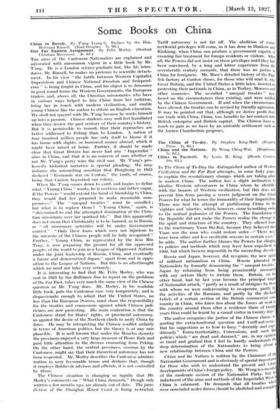Some Books on China
China in Revolt. By T'ang Leang-li. Preface by the Hon. Bertrand Russell. (Noel Douglas. 7s. 6d.) Our Far Eastern Assignment. By Felix Morley. (Student Christian Movement. 3s. 6d.) TIIE aims of the Cantonese Nationalists are explained and advocated with uncommon vigour in a little book by Mr. T'ang. He is a London science graduate but, like his intro- ducer, Mr. Russell, he makes no pretence to scientific detach- ment. In his view "the battle between Western Capitalist Imperialism and Chinese National Freedom and Independ- ence' is being fought in China, and his object is to denounce in good round terms the Western Governments, the European traders and, above all, the Christian missionaries who have in various ways helped to free China from her isolation, bring her in touch with modern civilization, and enable young Chinese like the author to obtain an English education. We shall not quarrel with Mr. Tang because he works himself up into a passion. Chinese students may well feel humiliated when they review the past century of their country's history. But it is permissible to remark that their reproaches are better addressed to Peking than to London. A nation of four hundred million people has only itself to blame if it has borne with slights, or borrowed money abroad, which it might have raised at home. Further, it should be made clear that Great Britain has never had any " Imperialist" aims in China, and that it is no concern of ours whether or not Mr. T'ang's party wins the civil war. Mr. Tang's pro- fessedly historical narrative is special pleading. We may instance the astonishing assertion that Hongkong in 1925 declared "Economic war on Canton," the truth, of course, being that Canton boycotted our colony.
When Mr. T'ang comes down to earth and begins to define • what " Young China " wants, he is cautious and rather vague. If the Powers "would extend the hand of friendship to China, they would find her prepared to make reasonable com- promises." The " unequal treaties " must be annulled ; but what is to replace them ? "Young China," again, is "determined to end the attempted domination of the Chris- tian missionary over her spiritual life." But this apparently does not mean that Christianity is to he banned, as in Russia, as " all missionary activities will be under Government • control." " Only these loans which were not injurious to the interests of the Chinese people will be fully recognized." Further, "Young China, as represented by the Kuo Min Tang, is now preparing the ground for all the oppressed peoples of the world to join in a League of Oppressed Nations under the joint leadership of Russia, China, and eventually a future and democratized Japan," apart from and in oppo- sition to the League of Nations. But this is an afterthought which we need not take very seriously.
It is interesting to find that Mr. Felix Morley, who was , sent in 1925 by the Baltimore Sun to report on the problems of the Far East, takes very much the same view of the Chinese question as Mr. Tang does. Mr. Morley, in his readable little book, puts the Cantonese ease very temperately, and is dispassionate enough to admit that the United States, no less than the European Powers, must share the responsibility for the treaties and concessions against which Chinese 'poli- ticians are now protesting. His main contention is that the Cantonese stand for States' rights, or provincial autonomy, as against the desire of the Northern chiefs to unify China by force. He may be interpreting the Chinese conflict unfairly in terms of American polities, but the theory is at any rate plausible. It is well known that under the Manchu dynasty the provinces enjoyed a very large measure of Home Rule and paid little attention to the decrees emanating from Peking. On the other hand, the central provinces, overrun by the Cantonese, might say that their theoretical autonomy has not been respected. Mr. Morley describes the Cantonese adthinis- • tration in very favourable • terms and declares that, though it employs Bolshevik advisers and officials, it is not controlled , by them.
The Chinese situation is changing so rapidly that Mr. Morley's comments on "What China demands," though only written a few months ago, are already out of date. The juris- diction of the .Shanghai. Mixed _Court_ is , being. re.stricted:
Tariff autonomy is not far off. The abolition of extra, territorial privileges will come, as it has done in Hankow and
K.iukiang, when China can produce a government capable of ensuring fair treatment for foreign residents or visitors. After all, the Powers did not insist on these privileges until they had been convinced, by a long and bitter experience from the seventeenth century onwards, that there was no justice in China for foreigners. Mr. Muse's detailed history of the Eng. lish factory at Canton shows, for those who will read it, why Great Britain, and the United States a little later, insisted on protecting their nationals in China, as in Turkey, Morocco and other countries. The so-called "unequal treaties" were based on the circumstances then existing, and were ratified by the Chinese Government. If and when the circumstances have altered, the treaties can be revised by friendly agreement. It may be pointed out that, although we derive profit from our trade with China, China, too, benefits by her contact with British enterprise and British capital. The Chinese have as much to gain as we have by an amicable settlement such as Sir Austen Chamberlain proposes.






























































 Previous page
Previous page